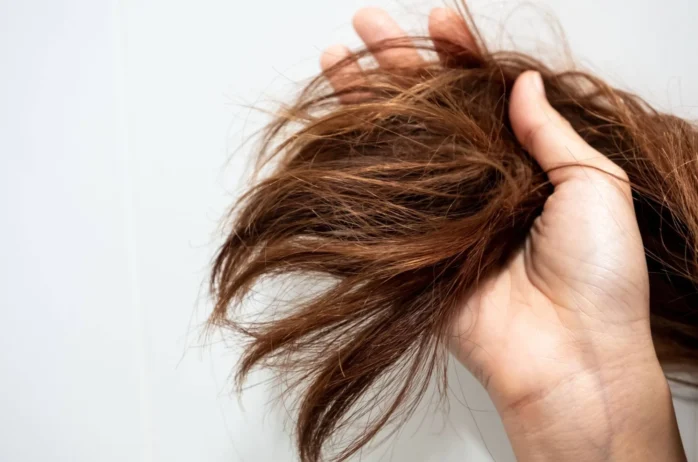Knowing the most important Causes of dry hair and care tips of it. Several home remedies can help alleviate dry hair, such as reducing the frequency of washing, minimizing heat styling, using silk wraps or pillowcases while sleeping, and selecting hair care products specifically formulated for your hair type.
Dry hair can stem from various lifestyle factors or even underlying health conditions. Fortunately, there are simple and effective home treatments that can nourish and revitalize hair when it becomes dry or brittle.
Causes of dry hair
Dry hair is a common issue that affects many people, leaving hair looking dull, brittle, and prone to breakage. But what exactly causes hair to lose its moisture and vitality? Understanding the underlying factors can help you take the right steps to restore your hair’s health and shine. Here’s an overview of the most common causes of dry hair:
1. Dry Scalp
Your hair depends on natural oils produced at the roots to stay hydrated and healthy. When your scalp becomes dry, it produces less oil, leading to dry hair. A dry scalp can also cause peeling and shedding of the skin, resulting in visible dandruff flakes. Since the scalp is directly responsible for hair moisture, any imbalance here will affect the overall condition of your hair.
2. Age
As we age, the body produces less oil, and this includes the oil from your scalp. The natural aging process, along with hormonal changes—especially after menopause—can lead to less sebum production. The result is drier hair that may become more prone to thinning or damage over time.
3. Environmental Conditions
Environmental factors play a significant role in hair dryness. Conditions like:
- A dry, hot climate
- Frequent sun and wind exposure
- Chlorinated or salty water from swimming pools or oceans
- All these factors can strip hair of its natural moisture, making it difficult for the scalp’s oils to keep up with the demand, leading to dryness and damage.
4. Lack of Protection for Hair Strands
Healthy hair is protected by a cuticle, which acts as a shield for the hair shaft. The cuticle’s layers, similar to shingles on a roof, protect the hair from environmental damage while keeping moisture inside. However, when these layers become damaged or peel away, moisture escapes, and the hair becomes dry, brittle, and weak. Without proper care, this loss of protection leads to further damage and breakage.
5. Home Hair Care Practices
Sometimes, our own hair care routines are to blame for dry hair. Common culprits include:
- Washing too frequently, which strips the hair of natural oils
- Using harsh shampoos that further dry out hair
- Overusing blow dryers, curling irons, or straighteners, which apply damaging heat
- Chemical treatments such as dyes, perms, or relaxers that weaken the hair’s structure and cuticle
6. Health Problems
Certain health conditions can affect hair health, leading to dryness and even hair loss. Some of these conditions include:
- Eating disorders like anorexia nervosa and bulimia, which deprive the body (and hair) of essential nutrients.
- Hormonal disorders such as hypothyroidism or hypoparathyroidism, which can impact the hair’s ability to stay moisturized.
- If you experience dry hair along with symptoms like fatigue, cold intolerance, weakness, or hair loss, it’s important to consult your doctor to rule out any underlying health issues.
Dry hair remedy
To improve the health and appearance of your hair, consider adjusting your hair care routine in these ways:
- Wash your hair less frequently: Many people can maintain healthy hair by washing it just once or twice a week instead of every day. Reducing the frequency of washes also means less blow-drying and heat styling, which helps minimize heat damage.
- Choose a gentle shampoo: Opt for shampoos specifically formulated for dry hair, as they typically contain fewer harsh detergents that can strip your hair of moisture.
- Use a moisturizing conditioner: Conditioning your hair regularly helps seal the hair cuticles, locking in natural oils and keeping your hair smooth and hydrated.
- Avoid alcohol-based products: Hair products that contain alcohol can dry out your hair, so it’s best to select alcohol-free alternatives to maintain moisture levels.
- Incorporate natural oils: Massaging your hair with natural oils like coconut or jojoba can deeply nourish and moisturize your strands, leaving them soft and shiny.
- Consider professional deep conditioning treatments: If your hair still feels dry after trying these methods, consult your hairstylist about deep conditioning treatments that can provide an extra boost of hydration.
- Trim split ends regularly: Split ends contribute to a frizzy texture. Regular trims can help your hair look and feel smoother by removing damaged ends.
- Support your hair from within: Ensure you’re getting key vitamins and minerals like iron, vitamin D, folate, vitamin B12, and selenium, which play a vital role in promoting healthy hair growth.
By following these steps for Dry hair remedy, you can enhance the moisture, strength, and overall vitality of your hair.
Our Categories
Helpful Links
Information
Copyright © 2023 Estel International


